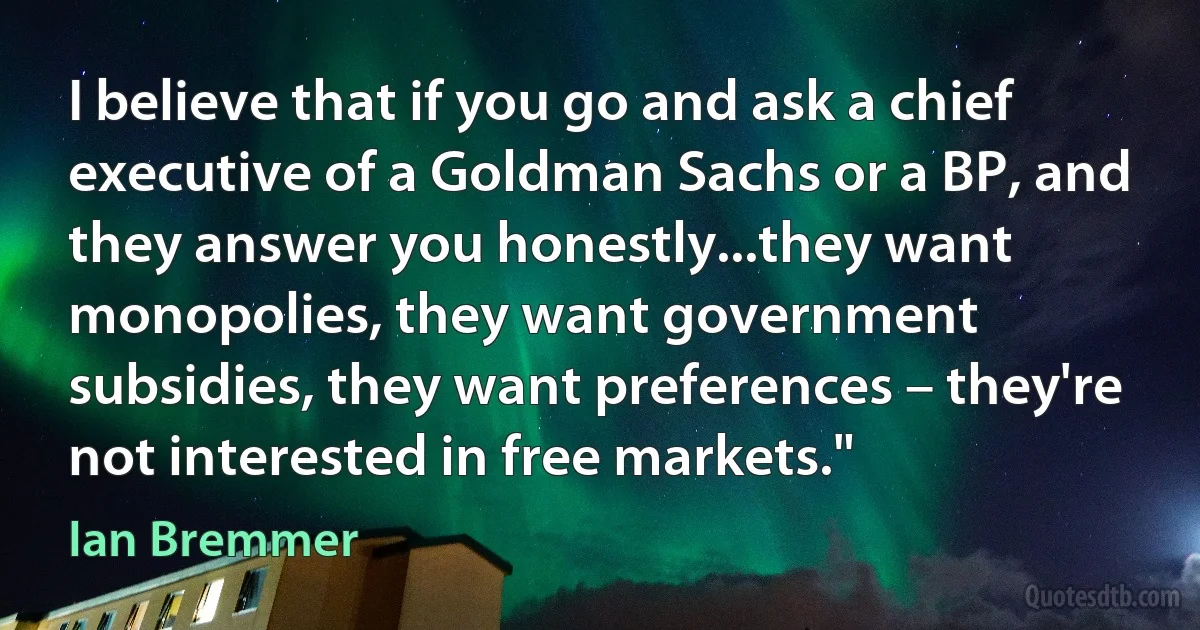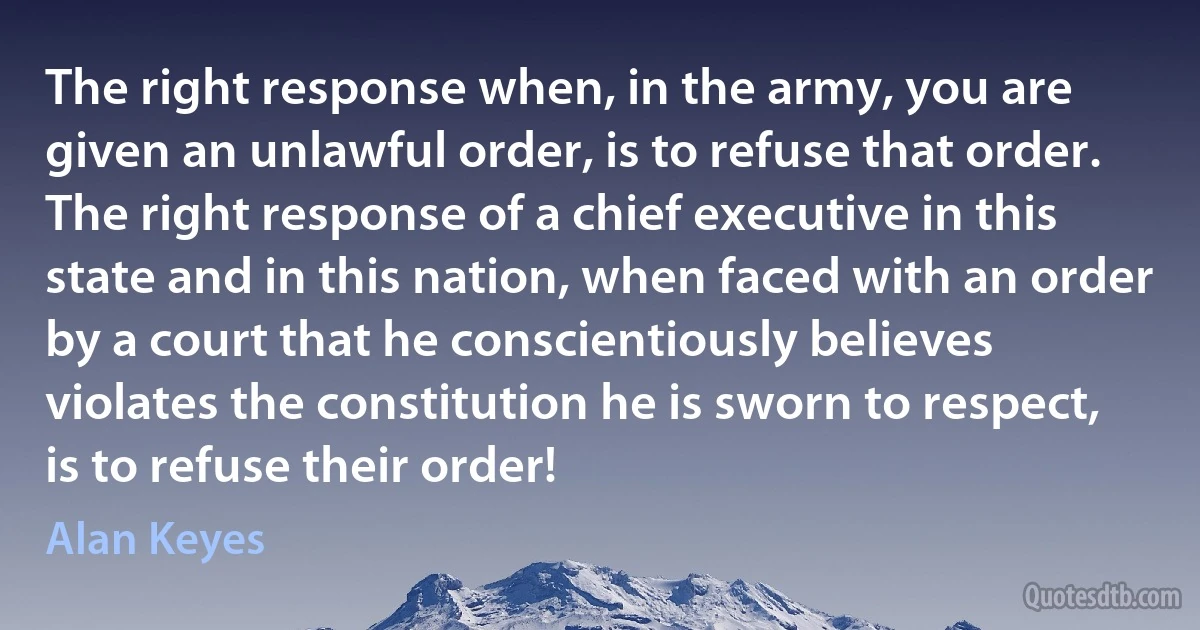Executive Quotes - page 8
From the beginning while we were engaged in these issues, I said in interviews with those who came from abroad, even in Najaf or Paris or among my personal words, I have always said that clerics have an occupation which is more important than these executive jobs, and should Islam become victorious, clerics would dedicate themselves to their own occupation. But as we went on with the revolution, we found out that if we tell all clerics to go after their mosques, this country would fall into the throat of America and Soviet Union. We experienced and saw, those who took the lead but were not clerics, even though some of them were religious people, our revolutionary path was not according to their taste, therefore... we temporarily deviate from our original word until this country could be administered by those other than clerics, then clerics will go back to their preach and their own position and they will leave executive matters to others who work for Islam.

Ruhollah Khomeini
...in the Executive, Grant and Boutwell were varieties of the type - political specimens - pathetic in their helplessness to do anything with power when it came to them. They knew not how to amuse themselves; they could not conceive how other people were amused. Work, whiskey, and cards were life. The atmosphere of political Washington was theirs - or was supposed by the outside world to be in their control - and this was the reason why the outside world judged that Washington was fatal even for a young man of thirty-two, who had passed through the whole variety of temptations, in every capital of Europe, for a dozen years; who never played cards, and who loathed whiskey.

Henry Adams
That is a widespread myth, that it is possible to spend money with nobody paying for it. You have everybody screaming that we ought to have new, bigger, more generous government programs. Where are we going to raise the money? Tax business. But business corporations can't pay any taxes. A corporate executive may sign the check, but where does he get the money? From his stockholders or from his customers or from his employees. Unlike the federal government, he doesn't have a printing press in his basement. So the only way he can pay money to the government is imposing a burden on somebody. Government cannot spend money at nobody's expense.

Milton Friedman
IN a free‐enterprise, private‐property system, a corporate executive is an employe of the owners of the business. He has direct responsibility to his employers. That responsibility is to conduct the business in accordance with their desires, which generally will be to make as much money as possible while conforming to the basic rules of the society, both those embodied in law and those embodied in ethical custom. Of course, in some cases his employers may have a different objective. A group of persons might establish a corporation for an eleemosynary purpose-for example, a hospital or school. The manager of such a corporation will not have money profit as his objective but the rendering of certain services. In either case, the key point is that, in his capacity as a corporate executive, the manager is the agent of the individuals who own the corporation or establish the eleemosynary institution, and his primary responsibility is to them.

Milton Friedman
Great leaders recognize that companies must innovate to remain competitive, and they nurture environments that encourage creative thinking... Innovation is rarely accidental - it takes an organizational commitment that starts at the executive level. The idea is not enough. As Thomas Edison said, innovation is 1% inspiration and 99% perspiration. Too often companies forget the ‘perspiration' or execution part of the equation.

Gregory Balestrero
The clean power plan is something that Senator Sanders has said he would delay implementing, which makes absolutely no sense. We need to implement all of the president's executive actions and quickly move to make a bridge from coal to natural gas to clean energy. That is the way we will keep the lights on while we are transitioning to a clean energy future. And when I talk about resilience, I think that is an area we can get Republican support on.

Hillary Clinton
Vice President Cheney has been the most dangerous vice president we've had probably in American history. The idea he doesn't realize that Article I of the Constitution defines the role of the vice president of the United States, that's the Executive Branch. He works in the Executive Branch. He should understand that. Everyone should understand that. And the primary role of the vice president of the United States of America is to support the president of the United States of America, give that president his or her best judgment when sought, and as vice president, to preside over the Senate, only in a time when in fact there's a tie vote. The Constitution is explicit. The only authority the vice president has from the legislative standpoint is the vote, only when there is a tie vote. He has no authority relative to the Congress.

Joe Biden
I do have the toughest, most comprehensive plan to go after Wall Street. And not just the big banks, all the other financial interests that pose a threat to our economy. And I have said no bank is too big to fail and no executive is too powerful to jail, and I will use the powers that have now been passed by the Congress, by President Obama, who, incidentally, took a lot of money from Wall Street, which didn't stop him from signing into law the toughest regulations on the financial industry since the Great Depression. There are a lot of different powerful interests in Washington. I've taken them on. I took on the drug companies. I took on the insurance companies. Before there was something called Obamacare, there was something called Hillarycare, and I worked really hard to get comprehensive health care reform.

Hillary Clinton
We all would to know more and, at the same time, to receive less information. In fact, the problem of a worker in today's knowledge industry is not the scarcity of information but its excess. The same holds for professionals: just think of a physician or an executive, constantly bombarded by information that is at best irrelevant. In order to learn anything we need time. And to make time we must use information filters allowing us to ignore most of the information aimed at us. We must ignore much to learn a little.

Mario Bunge
We have had here within these few days some serious scenes, at which I am not surprised, because I foresaw not only a struggle between the two corps, which the constitution had organized, viz. the executive (so called) and the legislative. But I was convinced that the latter would get the better. Such is the natural, and indeed the necessary order of things. It is nevertheless a painful reflection, that one of the finest countries in the world should be so cruelly torn to pieces. The storrn which lately raged is a little subsided, but the winds must soon arise again, and perhaps from the same, perhaps from another quarter. But that is of but little consequence, since in every case we must expect a little rage and devastation. A man, attached to his fellow men, must see with the same distress the woes they suffer, whether arising from an army or from a mob, and whether those by whom they are inflicted speak French or German.

Gouverneur Morris
Lenin's thesis is that the party Central Committee should have the privilege of naming all the local committees of the party. It should have the right to appoint the effective organs of all local bodies from Geneva to Liege, from Tomsk to Irkutsk. It should also have the right to impose on all of them its own ready-made rules of party conduct. It should have the right to rule without appeal on such questions as the dissolution and reconstitution of local organizations. This way, the Central Committee could determine, to suit itself, the composition of the highest party organs. The Central Committee would be the only thinking element in the party. All other groupings would be its executive limbs.

Rosa Luxemburg
A digital computer can usually be regarded as consisting of three parts: (i) Store. (ii) Executive unit. (iii) Control. ...The executive unit is the part which carries out the various individual operations involved in a calculation. ...It is the duty of the control to see that...[the table of] instructions are obeyed correctly and in the right order. ...A typical instruction might say-"Add the number stored in position 6809 to that in 4302 and put the result back into the latter storage position." Needless to say it would not occur in the machine expressed in English. It would more likely be coded in a form such as 6809430217. Here 17 says which of various possible operations [add] is to be performed on the two numbers. ...It will be noticed that the instruction takes up 10 digits and so forms one packet of information...

Alan Turing
The Labour Party has now been taken over by extremists...The Labour Party is now committed to a programme which is frankly and unashamedly Marxist, a programme initiated by its National Executive and now firmly endorsed by its official Party Conference. In the House of Commons the Labour Left may still be outnumbered, but their votes are vital to the continuance of Labour in office, and that gives them a strength out of proportion to their numbers. And make no mistake, that strength, those numbers, are growing. In the constituency Labour parties, in the Parliamentary Labour Party, in Transport House, in the Cabinet Room itself, the Marxists call an increasing number of tunes...let's not mince words. The dividing line between the Labour Party programme and Communism is becoming harder and harder to detect. Indeed, in many respects Labour's programme is more extreme than those of many Communist parties of Western Europe.

Margaret Thatcher
The forces of good will must be mobilized in order to go the additional distance and make integration and the brotherhood of man a reality. First, the federal government must use all of its constitutional authority to enforce the law of the land. As we look back over the years, we must honestly admit that only one branch of the government has given consistent, forthright, vigorous leadership, namely the judicial branch of the government, but the executive and legislative branches of the government have been all too apathetic, all too silent, and sometimes hypocritical. The time has come for all of the branches of the federal government to work in a vigorous manner to make integration a reality.

Martin Luther King Jr.



